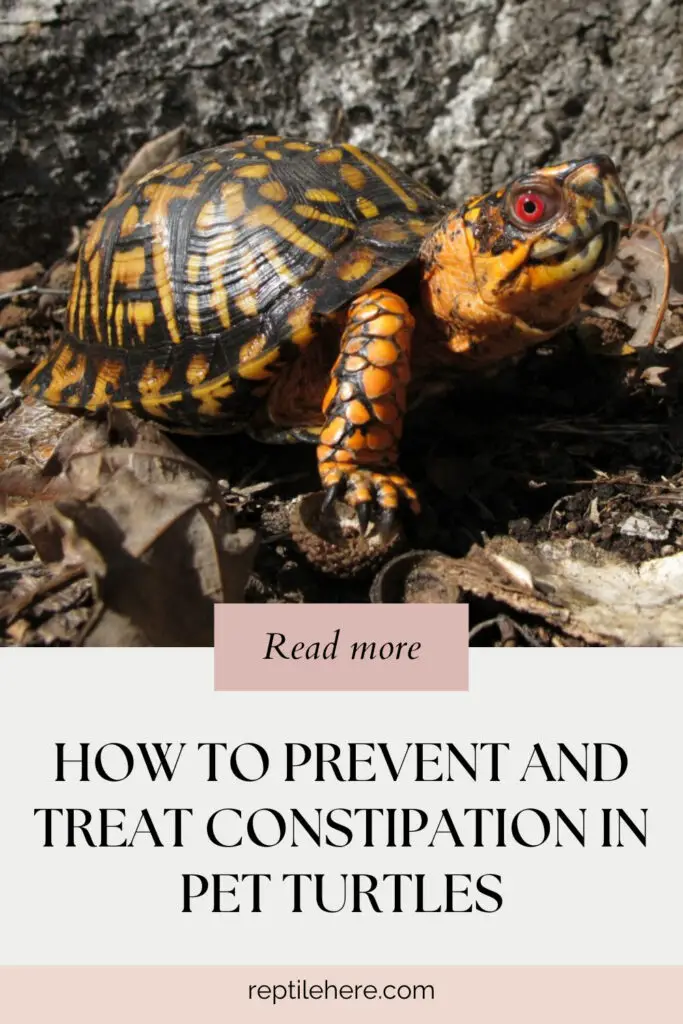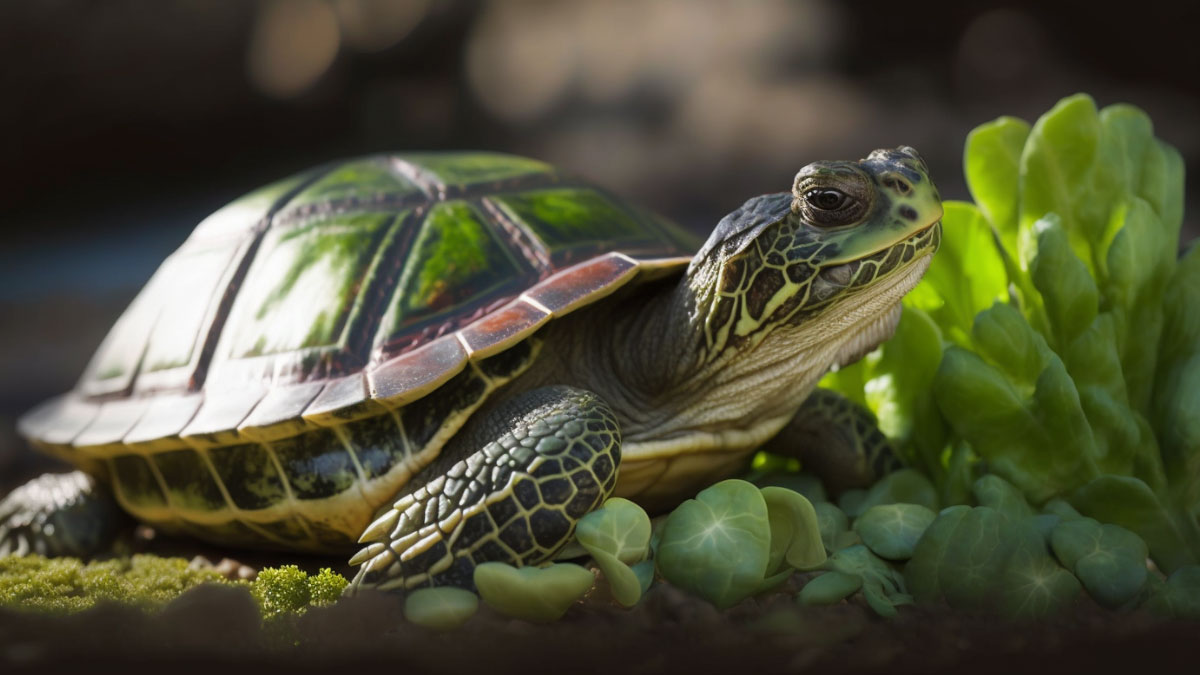How to Prevent and Treat Constipation in Pet Turtles
Constipation is one of the digestive system related problems your pet turtles may experience at some point. This issue is usually characterized by your pet not having bowel movements for days or even a week.
How to you prevent and treat constipation in pets? Constipation in pet turtles can be treated by putting your turtle in a warm water bath to cover its lower shell for 10 to 20 minutes and making the necessary diet adjustments to include foods like pumpkin which is a natural laxative.
This article will take you through in-depth details about constipation in pet turtles. You’ll learn the different causes of constipation. We’ll also cover the different methods for preventing and treating constipation, such as increasing water intake, adjusting your turtle’s diet, and more.
Common causes of constipation
Contents
Here are the most common culprits behind constipation in your pet turtle:
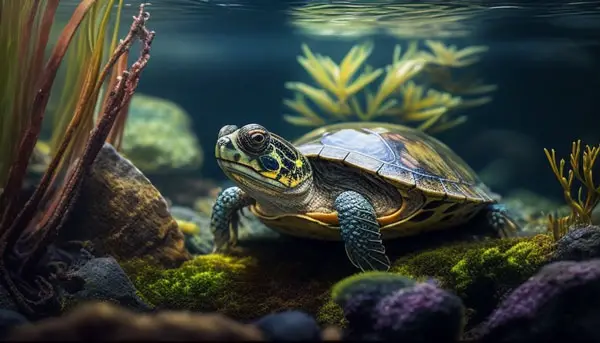
Inadequate diet
The most probable cause of constipation in your pet turtle is feeding it an impropriate diet. For instance, feeding your pet a diet containing too much proteins or low in fiber as well as other roughage can increase the risk of constipation. Feeding your turtle too refined foods may also lead to constipation (Source).
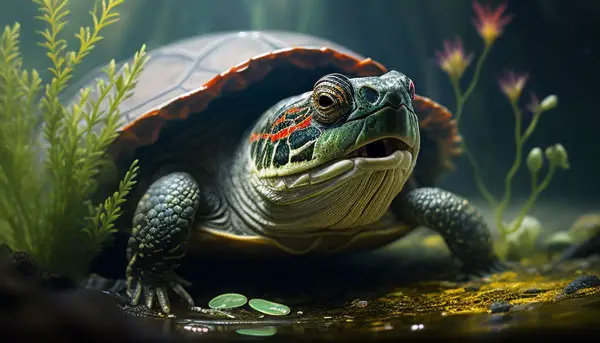
Dehydration
Dehydration is another potential culprit of constipation, especially in box turtles or terrestrial turtles in general. If you don’t provide your box turtle with a shallow water bowl where it can soak itself or even a water dish to drink, then it’ll likely suffer dehydration which will give it a hard time passing fecal matter. Note that diarrhea in box turtles due to an inappropriate diet can also lead to dehydration.
Impaction
Eating small rocks such as gravel substrate can cause total obstruction of the digestive system, resulting in impaction.
Turtles will try to eat anything inducing those small gravels you use as their substrate. They may also accidentally eat other foreign things alongside their food.
Unfortunately, your turtle may be unable to ingest and pass the small rocks through its bowels, resulting in impaction.
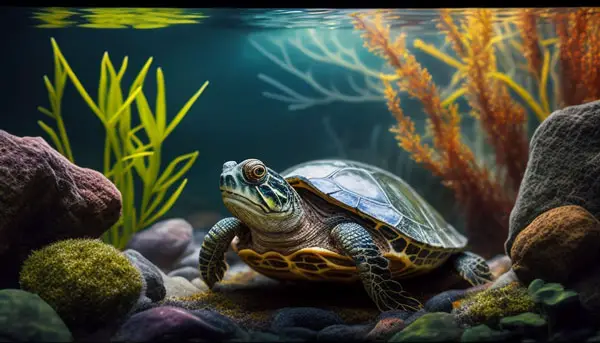
Key symptoms of this problem include severe constipation, your turtle may also stop eating completely or take less food than it normally does, and lethargy (your turtle may start hiding all day and appear more sluggish than normal).
Even worse, your turtle will not respond positively to the constipation remedies (more details about these remedies later in this article).
In this case, your only option is to get your turtle to the vet for professional help. If you suspect your turtle may have eaten a rock, be sure to mention this to your vet and even carry a sample of your substrate or the rock it may have eaten to your vet.
The vet will most likely conduct an x-ray on your turtle to get a good visual of the impaction. A fecal exam may also come in handy.
Lack of exercises
If your turtle takes in more calories than it spends or simply lack of exercise, then it’s also at risk of constipation. This usually happens if you don’t provide your turtle with a spacious tank where it can freely swim and move around.
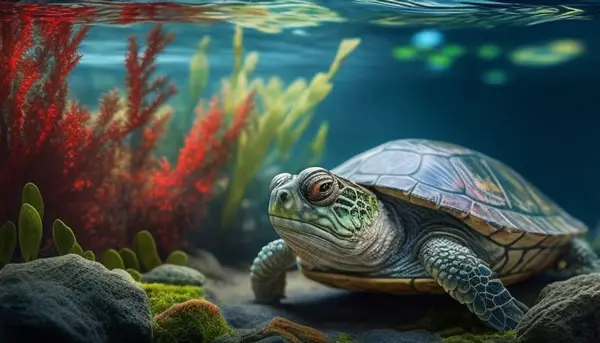
Exercises help stimulate your turtle’s bowel movements while also promoting proper functioning of the digestive system. If your turtle doesn’t get enough experience, then its digestive system will likely slow down and its fecal matter may become hard and challenging to excrete.
Stress
If your turtle is stressed, then it could also experience constipation. When under stress your turtle’s bowel movements can tend to become irregular and it may start experiencing constipation. Small animals generally constipate when under stress (Source).
Stress in your turtle can be caused by many things including changes in its environment, frequent handling, overcrowding, lack of hiding places, and poor living conditions.
Treatment methods for constipation in turtles
If your pet turtle becomes constipated, you should act first to help solve this issue early enough before it can lead to more serious complications in your turtle’s body.
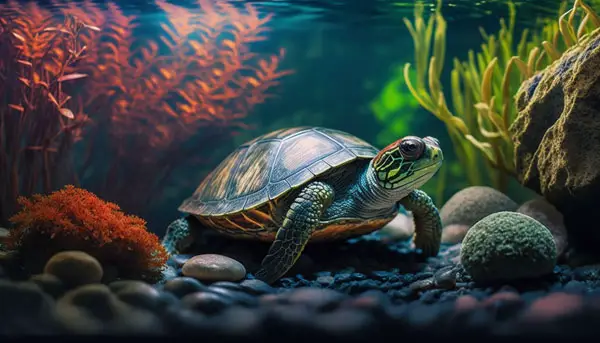
Ideally, you should be alarmed if your baby turtle goes for a few days without pooping or your adult goes for up to a week with bowel movements.
Warm bath treatment
The best approach for dealing with constipation in your turtle is to provide it with a lukewarm bath once every day.
Simply put some water in a shallow bath and make sure it’s not soo cool or too warm (it should be around 80 to 90 degrees F). Put your turtle inside the bath with its lower part covered and let it stay for approx. 10 to 20 minutes.
Make sure you keep the water depth shallow to prevent your turtle from drowning. Also, keep monitoring the temperature of the water throughout, especially if you’re dealing with a baby turtle which is more fragile than an adult.
In some cases, this warm bath treatment can help cure your turtle in the first trial but we advise you to continue with it daily for a baby turtle or once every week for an adult turtle.
Adjust your turtle’s diet
You should make adjustments to your turtle’s diet to help treat this problem. Consider adding pumpkin, and watermelon, to your pet’s diet for a few days. Pumpkin itself is a natural laxative and can go a long way in relieving your turtle.
You should also give your turtle a few drops of mineral oil to see if it can help with the issue. Or you can simply dip your turtle’s food in the mineral oil and then feed it to him.
NOTE: If your turtle doesn’t seem to get relieved after a week of warm baths and a special diet then it’s time to take him to the vet for professional assistance.
The video below shows a veterinary doctor explaining how to fix a constipated turtle
Video:
How to prevent constipation in turtles?
Here are helpful tips you can follow to keep your turtle free of constipation:
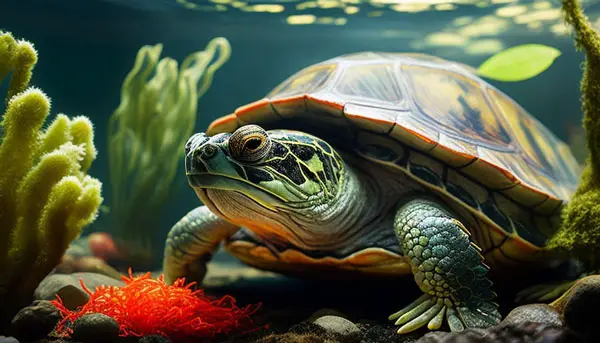
- Feed your turtle a proper diet. Review the diet you’ve been feeding your turtle and ensure it’s ideal for your specific turtle species.
- Ensure you provide your turtle with clean and fresh drinking water every day. You can also provide your box turtle with a shallow water dish to soak in to keep its body moist.
- Eliminate any small rocks or gravel substrate in your turtle tank. Substrate isn’t necessary to use in your turtle tank and it doesn’t affect the animal’s survival in any way. It only helps to make the tank look beautiful and more naturalistic.
- If you must use substrate, go for the large stones that your turtle is less likely to eat. This will help prevent impaction which is responsible for severe compaction in pet turtles.
- Provide your turtle with a spacious enclosure where it can regularly swim and exercise. This will help stimulate bowel movements and prevent constipation.
- You can also try giving your pet turtle some time outside the tank so it can walk around and exercise its body. But make sure you do this in a safe and controlled area and under your full supervision.
Final Verdict
Constipation is a common issue in pet turtles and can be caused by various issues including lack of proper diet, dehydration, rock ingestion, impaction, lack of exercise, and even stress. Taking action as soon as your pet turtle shows signs of constipation is recommended to ensure the issue doesn’t develop into more serious health problems.
You can treat constipation in your turtle by providing it with a warm water bath for around 10 to 20 minutes and adjusting its diet. But the ultimate best way to deal with constipation in your turtle is to stop it before it happens. Be sure to provide your turtle with a healthy diet, keep away small rocks in its tank, keep it well hydrated, and encourage regular exercise.
